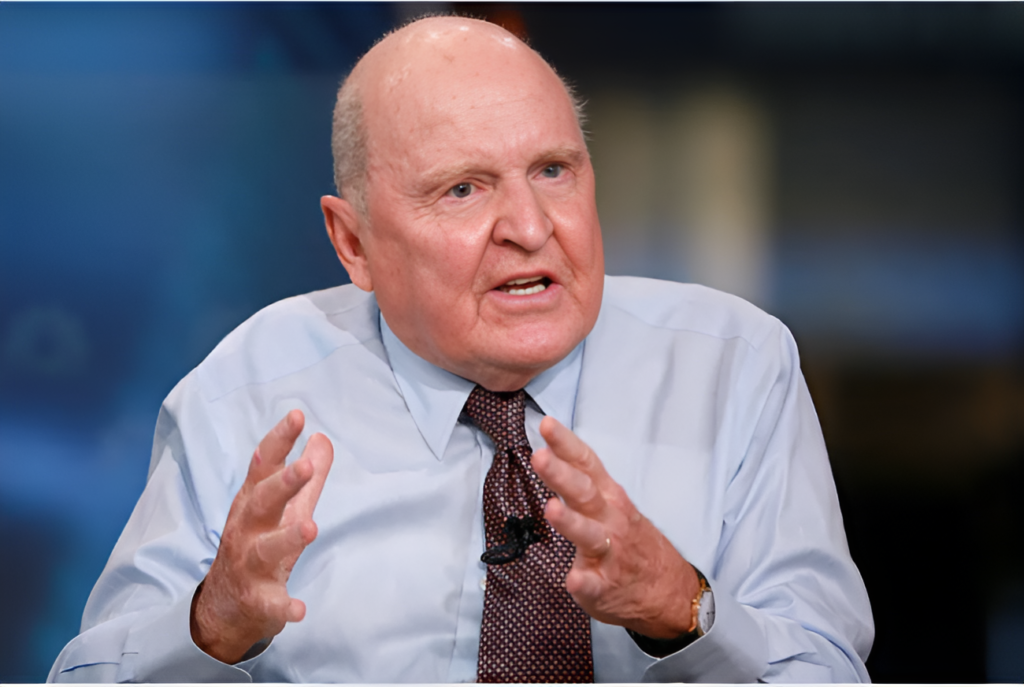
Jack Welch, the business mogul who transformed General Electric (GE) into one of the world’s most influential companies, passed away at 84. His death, confirmed by CNBC on Monday, was a profound moment for the business world that had long been shaped by his leadership style.
Welch, known for his sharp focus on cost-cutting and efficiency, earned the nickname “Neutron Jack” for his rigorous approach to management, including mass layoffs and restructuring. His tenure at GE saw the company’s stock surge nearly 3,000%, a feat that earned him the title of Manager of the Century by Fortune magazine in 1999.
“Jack Welch became the gold standard of greatness in business leadership,” said Jeffrey Sonnenfeld, a Yale business professor who worked closely with Welch. “His remarkable achievements as CEO are unparalleled.”
Welch’s leadership at GE was transformative. After becoming the youngest CEO in GE’s history in 1981, he streamlined the company, selling off underperforming divisions, and emphasizing core strengths like plastics, medical equipment, and financial services. His efforts reshaped GE into the world’s most valuable company by market capitalization in 1999.
However, Welch’s legacy is complex. His aggressive focus on cost reduction and profit maximization left GE vulnerable to future crises. The company’s reliance on GE Capital, a sprawling financial arm, ultimately contributed to GE’s downfall during the 2008 financial crisis. While GE flourished under Welch, some critics argue that the financial services unit shielded poor business decisions and that Welch’s heavy-handed tactics didn’t always deliver sustainable growth.
Welch’s second career as a consultant and media personality kept him in the public eye for over a decade after his 2001 retirement. He continued to influence the business world with his books and media appearances, including guest-hosting CNBC programs and offering advice to executives.
A Business Maverick and Mentor
Born on November 19, 1935, in Peabody, Massachusetts, Welch rose from humble beginnings. He earned a bachelor’s degree in engineering from the University of Massachusetts and a doctorate in chemical engineering from the University of Illinois before joining GE in 1960.
At GE, Welch made his mark by questioning the company’s outdated structures and focusing on improving its performance. By 1981, at just 45 years old, he was appointed CEO. His management philosophy was simple: remove inefficiencies, streamline operations, and focus on the core businesses that could thrive. Under his leadership, GE’s workforce shrank by a third, and he sold off more than 200 businesses, focusing on high-performing units.
The leadership philosophy Welch promoted—cutting costs, eliminating underperforming units, and empowering the best talent—became a model adopted by companies worldwide. His development of training programs like “Work-Out” and implementation of Six Sigma quality control methods further solidified GE’s standing as a business powerhouse.
The Welch Legacy
While Welch’s aggressive methods reshaped GE, they were also divisive. His successors, including Jeff Immelt, faced the challenge of sustaining the company’s momentum, but GE stock would never fully recover to its pre-9/11 heights.
Welch’s leadership left a lasting mark on corporate America, influencing business strategies across industries. His insistence on corporate efficiency, coupled with a fierce commitment to innovation, propelled GE to new heights, even as his critics questioned some of his methods in hindsight.
Outside of the boardroom, Welch was a larger-than-life figure known for his love of sports—particularly golf and baseball—and his high-energy persona. He was often seen on the golf course with figures like Warren Buffett and Bill Gates, and his passion for business was only matched by his love for mentoring the next generation of leaders.
Jack Welch’s influence extended far beyond GE, shaping corporate culture and leadership for decades. His passing marks the end of an era, but his legacy will undoubtedly continue to inspire and challenge business leaders for years to come.
A Personal Life in the Spotlight
Welch’s personal life was also widely scrutinized. After his first marriage ended in divorce, he married Jane Beasley, only to divorce again following a highly public affair with Suzy Wetlaufer, who later became his third wife. Despite the controversies, Welch’s reputation as a force of nature in the business world remained untarnished until his death.
In his autobiography, Jack: Straight from the Gut, Welch reflected on the influences that shaped his career, including his mother’s role in boosting his self-confidence and helping him overcome a childhood stutter. “She was the most influential person in my life,” he once said.
Welch’s passing leaves behind a complex but undeniable legacy, one that shaped not only the future of GE but also the landscape of corporate leadership worldwide





